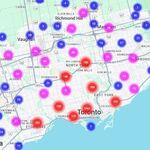interested
Senior Member
These numbers are for SFH's.
I would like to see downtown TO condo numbers from Teranet.
I would like to see downtown TO condo numbers from Teranet.
The yield on the 10 year Canadian bonds are now at a 2 year high....another mortgage bump coming?
http://www.cbc.ca/news/business/story/2013/08/22/royal-bank-mortgage-rates.html?cmp=rssTD Bank has joined the rest of Canada's big banks in hiking mortgage rates.
Its special five-year rate increased to 3.79 per cent on Thursday, up 10 basis points from 3.69, with the closed five-year rate now at 5.14 per cent.
On Wednesday, the Royal Bank said it is increasing several of its residential mortgage rates, including fix posted rates as well as special-offer rates. It was following Bank of Montreal which raised some of its mortgage rates Tuesday.
For the most part, Canada's largest bank is increasing the rates by 20 basis points, with its fixed five-year closed mortgage rising to 5.34 per cent and its five-year special rate to 3.89 per cent.
The rate changes are effective Thursday.
Other rates rising 0.2 percentage points include the bank's posted three- and four-year closed rates to 3.95 per cent and 4.74 per cent, respectively.
Royal's special offer four-year closed rate also goes up 20 basis points to 3.59 per cent, its seven-year special offer closed rate by 20 basis points to 4.19 per cent and its 10-year special offer closed rate to by 30 basis points to 4.59 per cent.
The five-year fixed closed rate and the five-year special fixed closed rate are now both 3.79 per cent.
Homeowners' monthly costs will rise
Laurentian Bank has also raised its rates, announcing on Wednesday 20-basis point boosts to its three-year, four-year and five-year fixed rates.
The rates are now 3.95 per cent, 4.74 per cent and 5.34 per cent, respectively.
Rising rates push up the average monthly costs faced by homeowners. A rise of 20 basis points means an increase in mortgage payments of $60 to $100 a month on a mortgage of $500,000. That's money homeowners won't have to put into other spending, including cars and home improvements.
In the past five months, banks have increased interest rates by more than a third, from less than three per cent to around 3.79 per cent. For most homeowners that means monthly costs are up eight to 10 per cent.
With many Canadians carrying a heavy debt load, rising mortgage rates can make housing less affordable for some families.
Yesterday, Finance Minister Jim Flaherty said he does not plan to intervene in the housing market and believes Ottawa has taken the steps necessary to calm overheated prices.
Younger generation never saw high rates
This generation of Canadians has never experienced high or even rising interest rates and may be surprised at the higher costs they face, said Benjamin Tal of CIBC World Markets economics department.
"The government has been trying to slow down the market for three-four years and now interest rates are joining the game. Now we have a situation in which especially young families in Canada will feel the pain," he told CBC News.
At this point, short-term rates look more attractive for most prospective buyers, Tal said.
"So far we haven’t seen any increase in the prime rate in Canada because short-term interest rates are not rising and won’t be rising any time soon at least until mid or early 2015, so you see long-term rates are rising and short-term rates are remaining where they are," he said.
However, he warns short-term rates may rise faster once they start to move upward. He expects the Bank of Canada may be ready to raise the prime rate in about a year
More rate hikes to come
Ben Rabidoux, an analyst with market research North Cove Advisors, said rates are definitely on the rise and will probably go up again in the next four to six months.
“Where we are right now, we’re still at extremely low interest rates historically. On the general trend, they’re going to jump and over the long term there is no question that they will be up,” he told CBC News.
Rates are rising because banks are facing higher yields on Canadian bonds, a result of the U.S. Fed signalling to investors that it will soon taper its purchase of U.S. bonds and mortgage-backed securities.
Canada had a huge influx of foreign capital when the Fed started its buying program in 2009 and when it slows its bond buyback, that capital will head back to the U.S., Rabidoux said.
CMHC’s cap on the value of mortgage-backed securities banks can create may also push up rates at which banks borrow capital, ultimately forcing interest rates higher.
But Rabidoux doesn’t expect the rate hike will affect housing prices until later in the fall, because many Canadians rushed to buy homes ahead of this round of hikes.
“A lot of the sales activity we’ve seen in the past month and a half is I think related to people who were rushing to beat the rate hikes. These rate hikes were very well telegraphed by the mortgage industry,” he said.
Those buyers locked in their rates 30 to 60 days ago and the impact on housing prices won’t be felt until a new round of prospective homeowners discover how much more expensive it is to carry a mortgage.
Nice to see 5-year bond yields finally rising. I hope that continues. I remember expressing a cautious tone when friends were wanting to buy a house in the winter of 2009. Fortunately they didn't listen to me. It turns out they bought on a dip, and have realized a (paper) gain of 30% or more. Who would have known? It is amazing how long interest rates have been so low. I have benefited in some way because I have a (income) property with very low financing costs, but we are holding tight (fortunate to find a nice rental) hoping to one day buy a principal residence. Any predictions on how long it will take for interest rates to increase 100 basis points more? When will the prime rate be increased?
I think a lot will depend on how quickly the Feds pull back on the quantitative easing - I thinks it going to be harder from them to pull out then they thought plus the major world economies are still sputtering in terms of economic growth. Personally I think that interest rates will continue to remain low over the next year with very minor increases.
thanks. I want to park money somewhere for a while, and don't have a problem with moderate risk. With money so cheap to rent, what asset classes, if any, have not received much investment?




